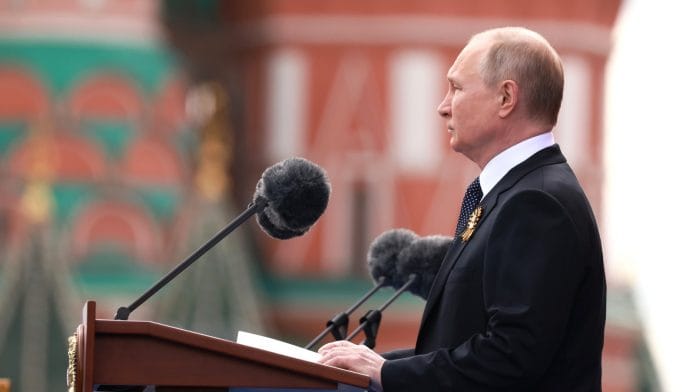Even for a country that has weaponized the memory of World War II to the point where there is a word for hyperbolic celebrations of Victory Day — pobedobesie, or victory frenzy — this year marked a new high. With its military bogged down in Ukraine, the domestic propaganda machine latched onto past successes instead, going into overdrive ahead of Monday’s commemorations. The fevered pitch, in turn, fueled overseas speculation that President Vladimir Putin would use the moment to mark a dramatic new stage in his two-month war.
That he did not — he used a brief speech on Red Square instead to evoke Soviet heroism and repeat assertions that Moscow was provoked into action, without once mentioning Ukraine by name — says plenty about the heightened expectations of foreign observers, mismatched with reality in a conflict that will grind on for some time. But it was also a reminder of the limits of Putin’s power. Even autocrats cannot mobilize a nation for war, having called it a “special military operation,” without unwanted costs. Nor can they easily spin defeat as national success.
Long a popular holiday given the vast majority of Russians who have World War II veterans in their families, May 9 (the day that the Allies accepted Germany’s unconditional surrender) has become an even more central holiday under Putin, part of his efforts to rehabilitate the Soviet Union and boost national pride. He has nurtured the cult of the Great Patriotic War and appropriated Soviet victory over Nazi Germany — so much so that he has used the language of Nazism and fascism to justify the invasion of Ukraine. Never mind that Ukraine’s president is Jewish, or that the war saw its territory devastated and somewhere between 5 and 7 million of its people killed. The mythology is so overpowering and so separated from fact that earlier this month Foreign Minister Sergei Lavrov suggested Adolf Hitler “had Jewish blood,” angering Israel and prompting a rare Kremlin apology.

The Russian leader, an amateur historian and a man fond of symbolism, would have gladly used a day full of pomp to declare victory. But declaring victory involves defining the required endgame, which Moscow’s unclear, changing war goals have made hard to do. As Ben Noble of University College London pointed out to me, having flexible aims has been useful for the Kremlin, hampering efforts by elites back home to ask inconvenient questions — say, when troops had to retreat from around Kyiv and refocus on the east of the country. But Moscow has also created multiple ideas of what success looks like, making it far harder to agree on a finale without angering at least some loud voices.
Another awkward point is that Russia is not winning. Sure, the war is not over, and Russia could yet defeat Ukraine. But for now, even efforts to overpower the southern port of Mariupol are hard to spin as success. Russian forces are stuck in a conflict that has battered the country’s military reputation, depleted its fighting force and, thanks to sanctions in reaction to the invasion, decimated its economic prospects. As long as oil exports continue and central bank support is in place, revenues don’t look too paltry and the ruble is holding up. But the departure of ordinary Russians in droves says more far about reality on the ground. To hold on to IT professionals — some 50,000 to 70,000 left in March alone, and 100,000 were forecast to leave last month — Putin has been forced to bring in perks that include everything from tax holidays to the ability to avoid conscription.
Russians have rallied around the flag and will take some pain in what their government relentlessly portrays as a fight against Western aggressors — Monday’s speech was aimed at cementing that narrative — but it’s quite another thing to be asked to take the current situation as a victory, and to keep up the pretense. Apart from a highly choreographed rally in Moscow’s Luzhniki Stadium, popular demonstrations of support have been few.
So why did Putin not heed the perma-shouting hawks on Russia’s television and formally declare war, call for mass mobilization? There is evidence of moves in this direction, and it may yet be inevitable. But shattering the pretense of normalcy that comes with dubbing a war a “special military operation” would have meant acknowledging this effort’s astronomical cost, plus recognizing that the new normal of sanctions and isolation is here to stay — something the Kremlin is also less than eager to do.
Putin could still do everything that was expected of him on Monday. But it speaks to his few options for the future that he has instead surrounded himself with bombast, military theater and cliches — stuck in the past.- Bloomberg
Also read: Europe dreams of military power, but NATO’s still in charge. India must engage with caution






